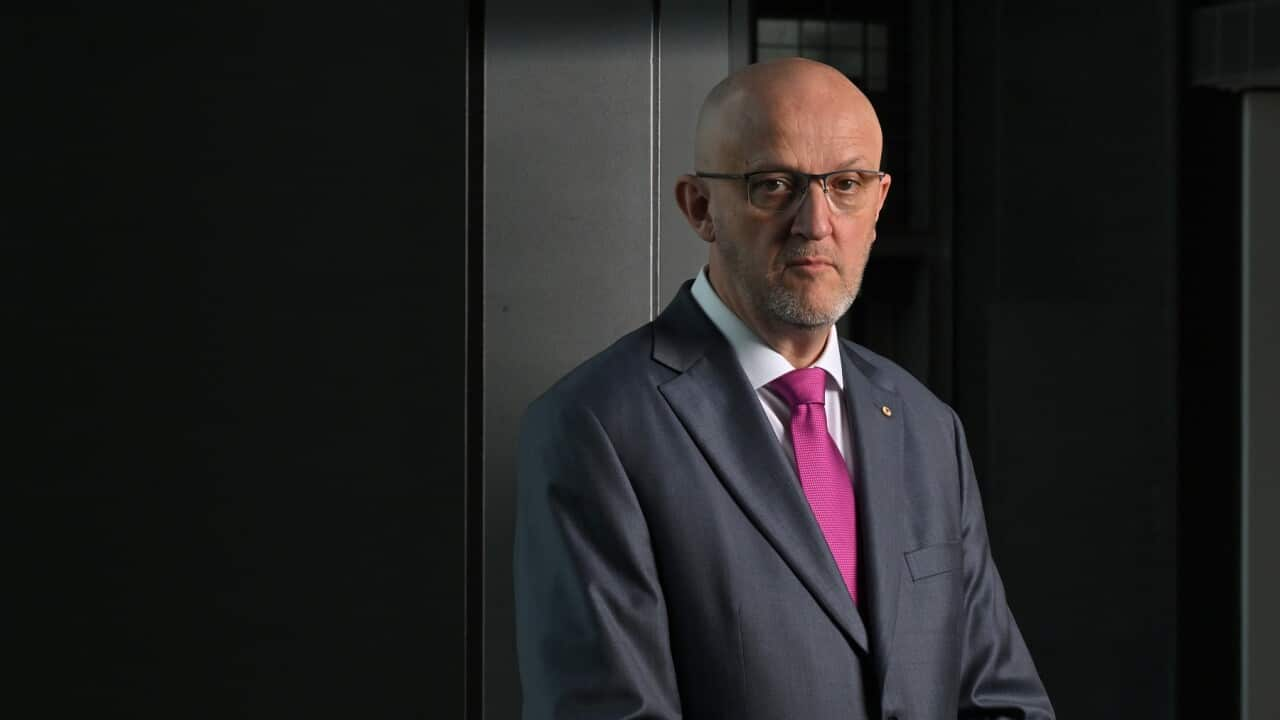TRANSCRIPT
"Make no mistake: we are charting significant changes in the security climate, changes that ASIO will be required to counter."
It's a stark warning from Australia's top spy: Mike Burgess, the head of the Australian Security Intelligence Organisation, or ASIO.
Just what those challenges are has been laid bare in Mr Burgess' annual threat assessment, delivered to an audience in Canberra that's included intelligence officials, police, and diplomats - including the Chinese ambassador.
“Great power competition in our region is driving heightened levels of espionage and foreign interference, while rapid advances in technology are accelerating almost all the trends I'm describing.”
Mr Burgess says security challenges are playing out in Australia in a range of different ways.
“Over the next five years, a complex, challenging and changing security environment will become more dynamic, more diverse, and more degraded. Many of the foundations that have underpinned Australia's security, prosperity, and democracy are being tested. Social cohesion is eroding. Trust in institutions is declining. Intolerance is growing. Even truth itself is being undermined by conspiracy, mis and disinformation.”
The threat assessment has revealed that military personnel are among those to have been targeted in security operations.
“Multiple countries are relentlessly seeking information about our military capabilities. Defence personnel are being targeted in person and online. Some were recently given gifts by their international counterparts. The presents contained concealed surveillance devices.”
He says AUKUS is already a particular target.
“ASIO has identified foreign intelligence services seeking to target AUKUS, to position themselves to collect on the capabilities, how Australia intends to use them, and undermine the confidence of our allies. By 2030, as the submarine project matures, intelligence services are more likely to focus on foreign interference, to undermine community support for the enterprise, and potentially sabotage if regional tensions escalate.”
Australia's online systems are also being used by foreign actors.
Mr Burgess says as the world becomes more complicated and competitive, nation states want to use everything at their disposal to gain greater insights into their enemies, and sometimes their friends.
“We are getting closer to the threshold for high impact sabotage. ASIO assesses authoritarian regimes are growing more willing to disrupt or destroy critical infrastructure to impede decision-making, damage war-fighting capabilities, and sow social discord. Russia's reckless campaign in Europe is a potent example.”
But Mike Burgess says individuals are also in the firing line.
The ASIO chief says nation state agents have been caught harassing and intimidating individuals who have migrated to Australia but are still considered a threat.
He says they identified campaigns by four countries to force people in Australia to return to their country of birth.
“In one operation, a foreign intelligence service wanted to silence an Australian-based human rights advocate. The scheme involved tricking the unsuspecting activist into visiting a third country where the plotters would be waiting. They planned to arrange an accident that was anything but accidental, with the objective of seriously injuring or even killing the activist.”
But Mike Burgess says Australian-born young people appear to be vulnerable to forces that seek to cause chaos - especially on the internet.
He says young Australians being caught up in what he's described as "webs of hate", driven by religiously and ideologically motivated groups, is an ongoing concern.
“The grievance narratives, conspiracies, and online echo chambers that proved so potent during COVID have festered and evolved into diverse threat environments susceptible to sudden shifts in response to events.”
The ASIO chief has spoken of a generation of digital natives – people who have spent all their formative years online – and how while there are ongoing threats from organised terrorist groups, the greatest threats have come from individuals on the periphery.
“Many of the recent cases we have dealt with are as sad and sobering as they are shocking: Minors allegedly sharing beheading videos in the schoolyard; a 12-year-old allegedly wanting to blow up a place of worship; a 17-year-old allegedly watching Nazi propaganda and Ku Klux Klan videos and scrawling "gas the Jews" on the walls of the classroom; a 12-year-old allegedly planning a school shooting.”
Mike Burgess says ASIO disrupted five plots to perform terrorist attacks in the last year, almost all of them involving children.
The chief says the median age at which children are first subject to an ASIO investigation is now 15 - with the caseload overwhelmingly male and Australian-born.
And that means authorities changing the way it addresses extremism.
“You cannot spy your way to less youth radicalisation. In this environment, national security truly is national security- it's everybody's business. Intelligence agencies such as ASIO will need to expand their partnerships beyond the traditional, but still critical, law enforcement and security relationships, to include education, health, social services, and big tech.”













